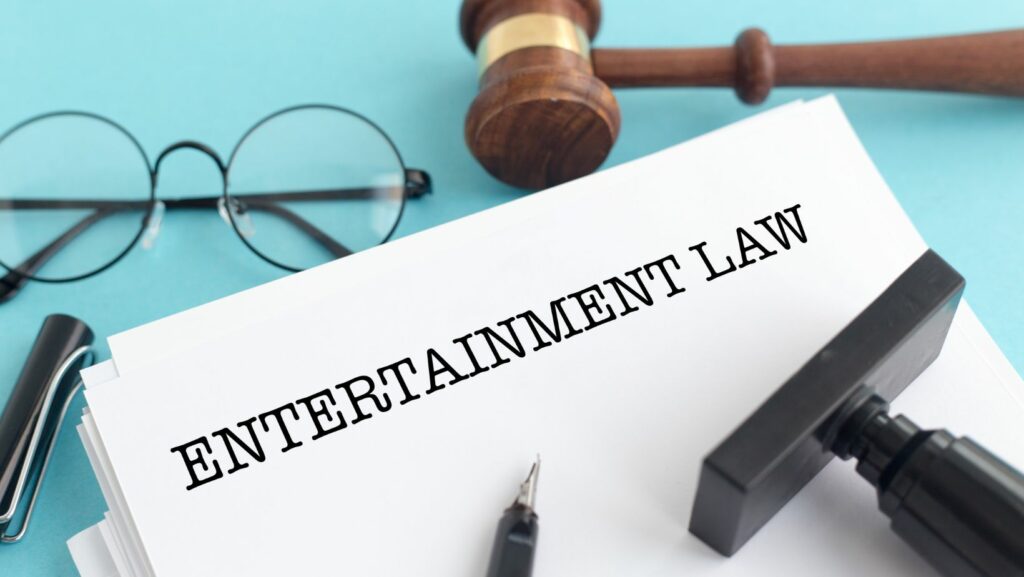Entertainment Law
- Understanding of Entertainment Law: Entertainment law is essential for protecting the rights of artists, producers, and consumers in the evolving creative industries, particularly amid digital media advancements.
- Key Legal Areas: The field encompasses crucial areas such as copyright law, contract law, employment law, and privacy law, each addressing different aspects of the entertainment industry.
- Importance of Contracts: Clear and enforceable contracts are vital for preventing disputes and ensuring all parties understand their obligations regarding payment, responsibilities, and project timelines.

- Intellectual Property Protection: Copyrights, trademarks, and patents are fundamental in safeguarding original creative works, helping to prevent unauthorized use and ensure revenue for creators.
- Navigating Legal Challenges: Professionals in the entertainment industry must be adept at identifying and handling legal challenges, including IP issues, litigation disputes, and compliance with labor laws.
- Role of Entertainment Lawyers: Entertainment lawyers play a crucial role in contract negotiation, intellectual property protection, dispute resolution, legal compliance, and relationship building within the industry.
Entertainment law plays a crucial role in the creative industries, protecting the rights of artists, producers, and consumers alike. As the landscape of entertainment evolves with digital media and streaming platforms, the complexities of this field continue to grow. Navigating contracts, intellectual property rights, and licensing agreements can be daunting, but understanding these elements is essential for anyone involved in the entertainment business.
From filmmakers to musicians, professionals rely on entertainment law to safeguard their work and ensure fair compensation. This specialized area of law not only addresses traditional media but also adapts to new technologies and platforms, making it a dynamic and ever-changing field. As the demand for content increases, so does the need for legal expertise in entertainment, making it a vital aspect of the industry.
Overview Of Entertainment Law
Entertainment law encompasses a wide range of legal issues that arise in the creative industries, particularly surrounding the production and distribution of entertainment content. It includes areas such as contract law, intellectual property law, labor law, and privacy law. This field plays a crucial role in safeguarding the rights of artists, producers, and consumers.
Contract law governs relationships between parties involved in entertainment projects. Contracts outline the terms of agreements, including payment, responsibilities, and project timelines. Clear contracts prevent disputes and ensure all parties understand their obligations.
Intellectual property law protects creative works such as music, films, and literature. Copyrights, trademarks, and patents play significant roles in this area, granting creators exclusive rights to their works. Understanding these laws prevents unauthorized use and helps maintain an artist’s brand and revenue streams.
Labor law addresses the rights of workers in the entertainment industry. It ensures fair wages, working conditions, and benefits for performers, crew members, and other employees. Compliance with labor laws is vital for both employers and workers to avoid legal disputes.
Privacy law is increasingly relevant in the age of digital media. It protects individuals’ rights to control their personal information and likeness, particularly in film and television productions. Legal frameworks govern the use of personal data, ensuring that creators respect privacy rights while promoting their work.
As digital media and streaming platforms continue to shape the entertainment industry, the significance of entertainment law grows. Professionals must navigate complex regulations and legal requirements to protect their interests. Robust legal expertise is essential for addressing these challenges and fostering a fair and equitable creative landscape.
Key Areas Of Entertainment Law
Entertainment law encompasses various critical areas that affect creative professionals and organizations. Understanding these areas is essential for navigating the complexities of the industry and protecting rights effectively.
Copyright Law
Copyright law provides protection for original works of authorship, such as music, films, and scripts. Copyright holders gain exclusive rights to reproduce, distribute, and display their works. Registration with the U.S. Copyright Office enhances these protections, allowing creators to pursue legal remedies for infringement. In the digital age, issues like unauthorized streaming and file sharing have raised new challenges, necessitating clearer guidelines and enforcement measures.
Contract Law
Contract law governs the agreements between parties involved in the entertainment industry. This includes contracts for production, distribution, licensing, and talent representation. Key elements of enforceable contracts involve mutual assent, consideration, and specific terms. Well-drafted contracts help prevent disputes and ensure all parties fulfill their obligations. Particular attention to clauses regarding payment terms, intellectual property rights, and termination conditions fosters clarity and security for all stakeholders.
Employment Law
Employment law addresses the rights and obligations of workers within the entertainment sector. This includes regulations concerning fair wages, working conditions, and workplace safety. Labor unions often represent workers in negotiations for better conditions and compensation. Specific laws, such as the Fair Labor Standards Act, outline minimum wage and overtime requirements. Adhering to employment law is vital for safeguarding the welfare of industry professionals while promoting a fair and equitable work environment.
Legal Challenges In The Entertainment Industry
Legal challenges involving entertainment law arise from various sources, particularly intellectual property issues and litigation disputes. Understanding these challenges is crucial for professionals navigating the complex landscape of entertainment.
Intellectual Property Issues
Intellectual property (IP) issues present significant challenges in the entertainment industry. Copyright infringement frequently occurs with unauthorized use of music, films, and other creative works. Copyright law protects original works and prevents unauthorized duplication or distribution. The advent of digital media and streaming services exacerbates these challenges, making enforcement difficult.
Trademark disputes also pose hurdles, particularly with branding and marketing. Companies must protect their trademarks from unauthorized use, which can dilute brand identity. Additionally, new technologies complicate the enforcement of IP rights, as the rapid sharing of content facilitates violations.
Patents for technological innovations in production and distribution offer another layer of complexity. Companies investing in new technologies must navigate the patent landscape to protect their innovations while avoiding infringement on existing patents.
Litigation And Disputes
Litigation and disputes arise frequently in the entertainment sector, often stemming from contract violations or disagreements over intellectual property rights. The industry relies on clear, enforceable contracts to outline the rights and obligations of all parties involved. Disputes can lead to costly litigation and damage reputations.
Common litigation issues involve breach of contract, where one party fails to meet agreed-upon terms, leading to financial loss for the other. Additionally, disputes regarding licensing agreements often necessitate legal intervention. Companies may find themselves in litigation over the terms and scope of rights granted for creative works.
Class action lawsuits can emerge from unfair labor practices, particularly concerning employee rights and treatment. As production practices evolve, workers increasingly seek legal recourse to address grievances related to wages and working conditions.
Navigating these legal challenges requires expertise in entertainment law, ensuring compliance and protection for artists and professionals in the industry.
The Role Of An Entertainment Lawyer
Entertainment lawyers serve crucial functions in the creative industries. They advise clients, ensuring compliance with laws that impact music, film, television, and digital media. Their expertise spans various legal aspects, allowing clients to navigate complex frameworks effectively.
Contract Negotiation
Entertainment lawyers negotiate contracts to protect their clients’ interests. They draft agreements for talent representation, production deals, and licensing. Clear and precise contract terms prevent disputes and promote fair relationships among parties involved.
Intellectual Property Protection
Intellectual property rights are vital for artistic works. Entertainment lawyers manage copyrights, trademarks, and patents, ensuring creators retain ownership of their content. They also handle infringement claims, addressing unauthorized use and enforcing creators’ rights.
Dispute Resolution
Disputes in the entertainment sector often escalate into litigation. Entertainment lawyers represent clients in legal proceedings, mediating conflicts related to contracts, rights, or employment issues. Their role includes preparing legal documents and presenting cases in court or negotiations.
Legal Compliance
Entertainment lawyers ensure that clients comply with federal, state, and local laws. This includes understanding labor regulations, licensing requirements, and safety standards. They help organizations operate legally, reducing the risk of lawsuits or fines.
Industry Insight
Familiarity with industry standards is essential. Entertainment lawyers provide valuable insights into market trends and emerging technologies, advising clients on adapting to changes. Their knowledge helps clients make informed decisions about productions and distribution strategies.
Relationship Building
 Entertainment lawyers help foster relationships between clients and industry players. They connect artists, producers, and distributors, facilitating collaborations and opportunities. Building strong networks enhances clients’ prospects in a competitive landscape.
Entertainment lawyers help foster relationships between clients and industry players. They connect artists, producers, and distributors, facilitating collaborations and opportunities. Building strong networks enhances clients’ prospects in a competitive landscape.
Entertainment lawyers play a pivotal role in navigating the complexities of entertainment law, ensuring that creatives are protected and empowered in their endeavors.
Shaping the Creative Landscape
Entertainment law plays a pivotal role in shaping the creative landscape. As the industry evolves with digital advancements, the complexities of legal issues continue to grow. Artists and professionals must remain vigilant in understanding their rights and responsibilities to thrive in this competitive environment.
The expertise of entertainment lawyers is indispensable in navigating these challenges. They not only safeguard the interests of their clients but also contribute to a fair and equitable creative community. As demand for content surges, the significance of entertainment law will only increase, ensuring that creativity is protected and valued in all its forms.



